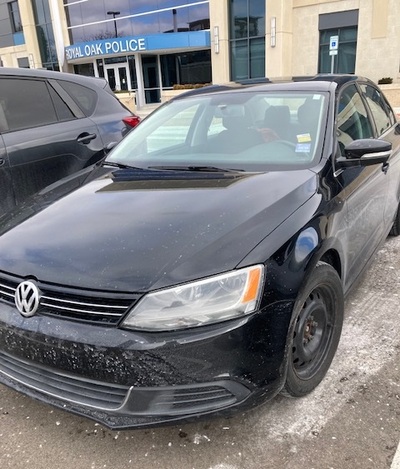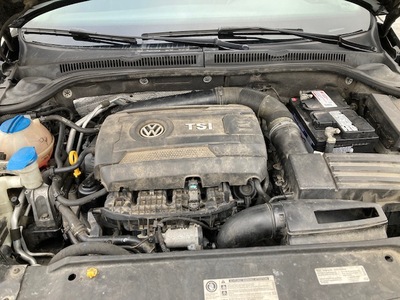My Dubby is the epitome of Bad Romance
But First An Authors Note: I gotta thank Suburban VW for all they've done to help me. It is the car itself. As press conferences roll out and everyone praises the new debutantes, let's think about what happens after sale.
 |
Senior Editor at Large
The Auto Channel
Michigan Bureau
Detroit MI February 10, 2022; Ra-Ra-ah-ah-ah ah, Jetta, Jetta oo- la-la-la. I’ve got Lady Gaga’s song, “Bad Romance,” stuck in my head, and a set of jumper cables from my wallet to my 2014 VW cowering in the garage. I have a love/hate relationship with this dastardly product. I can’t sell it and I can’t drive it.
This is my seventh VW and certainly my last. Whatever romance with the brand wooed me in regular intervals. $11,500 in repairs in the last year.
Before that I named it Sirius Black, the uncle of Harry Potter who flew to freedom aboard Buckbeat, the gigantic bird. I could glide anywhere on its wings. A little bad romance only made it more interesting. Until I became its slave.
I’m about to fork out $1,500 to Suburban VW for a heater core and radiator for the obstinate beast, less than a month out of the dealership after it took seven weeks to rebuild the engine that the mechanics rebuilt in April at a whopping $8,600. Not including its other maladies. It is driving me straight to the poorhouse.
In 2014, when this vehicle was built in Pueblo, Mexico, the economy was roaring. About 16.5 million units were sold. I can’t fathom how many had malfunctioning parts are just waiting to self-destruct. When I bought it for $17,000 with 24,000 miles from a certified-used-car dealer, I took a five-year loan and paid it off early. I loved the sunroof, heated seats and 1.8 turbo engine, mostly how it drove.
The car roared! It could hold the road at any speed, sip gas like a miser and hold enough camping gear to keep me comfy under the stars.
I’m a semi-retired freelance writer who has forked out $13,000 in car repairs, instead of buying something new. But the average price is almost $47,000 according to The Auto Channel last month. There’s little or no regress when mechanical failures engulf you. Nope, car makers don’t buy them back. Ra-Ra-ah-ah-ah ah, Jetta, Jetta oo- la-la-la. (Singing beats swearing)
 |
“I’ve had literally thousands of cases where a vehicle had constant problems - even safety problems - and the manufacturer refused to buy the vehicle back until a lawsuit was filed. Even then, many manufacturers will fight the lawsuit so long that they spend far more on attorney fees than it would have cost them to do the right thing in the first place.”
Lawsuits over high-mileage cars never go anywhere, Liblang cautions.
There was a time and another place. A tall, sweet boyfriend who kissed me by candlelight and took me motoring in the country in his 1978 Sirocco with a 1.5-liter engine tweaked and titillating. He collected so many speeding tickets he was forced to sell cheap in the early 80s. I bought it for a grand. And a grand time I had. Sold it for my first Jetta in 1984 and bought one after another.
Sure the VWs are persnickety. Little problems. Big problems. But nothing like owning Seymour, the ravenous plant in “Little Shop of Horrors.” It has gone from bad romance to gaslighting.
Friends gasp. Surely one car wouldn’t go bonkers so often.
I truly believe Volkswagen should buy it and explore what combination of factors creates a mechanically challenged automobile with 90,000 miles on it. Cash strapped people expect a couple hundred thousand miles use from their mechanical steeds.
So, I asked the company. VW paid half the cost of the timing chain, when my car wasn’t included in a timing chain recall of thousands that year. They paid part of the engine cost and supplied technicians to consult on the craziness of its electrical failures. Then the seven-month-old engine started leaking, but finding “where” became a long-winded problem. The shop suffered a paucity of technicians, Covid sweeping through the remaining staff, then the whole supply chain awaiting parts. Car stayed seven weeks.
Three days later an exhaust clamp broke, spewing toxic fumes everywhere.
Getting angry only makes things worse.
“The current concern was not related to the engine from April. They (the dealership) as a goodwill gesture, repaired the vehicle and provided alternate transportation due to “your loyalty”.
I am sorry you feel we do not stand behind our cars. I am also sorry you have had any concerns at all. We have done the best we can to help here and would not offer any further assistance,” wrote Katie Deel, Customer Retention Operations Lead in a letter to me.
The mantra from top on down, is that “the current concerns are not related to the older concerns,” if the engine leaks it can’t be from an engine that was rebuilt for $8,600. I go crazy. Carvana, the newest purchasing platform, offers me $5,800.
“You can’t sell it,” says Amir, the service manager. “You’ve got all these warranties on parts and repairs. Drive it till the wheels fall off.” To be sure, the dealership has bent over backward to help me through this. They gave me a free loaner car for the engine repairs. But the trauma is too much.
I can’t afford to keep it. Nor sell it.
“Jetta-Jetta-oo-la-la,” I sing along with Lady Gaga.




